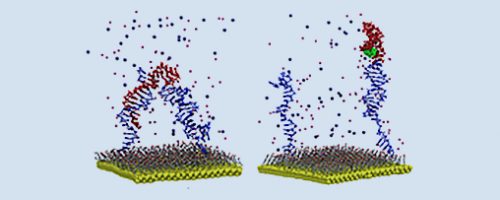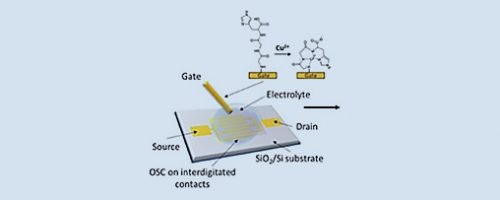Biosensors
Biosensors represent the core expertise of PRINTUP INSTITUTE researchers. The range of transistor-based biosensors developed by the institute is very broad.
Biosensors are measuring instruments that integrate a biological element (enzyme, antibody, plant or animal cell, DNA fragment, lipid, etc.) and a physical transducer (electrode, piezoelectric quartz, etc.). The biological element will be chosen according to the field of application envisaged and on the basis of the desired analytical performance criteria.
Ideally, the biosensor should be easy to use and provide direct analysis without sample processing. With printed electronics technology, the biosensor is miniaturised for low-cost single-use applications or for insertion into multi-measurement devices.
Biosensors are suitable for monitoring both bioprocesses and certain physiological parameters. Applications are developed either individually (glucose, lactate, etc.) or in hospitals (bedside, emergency, surgery, dialysis monitoring, etc.), in clinical analysis (DNA analysis, etc.) or in academic and industrial research. There are also applications in microenvironments (in vivo, isolated cells, etc.) or for decentralised spot measurements.
Most of the biosensors developed at the Institute are based on the architecture of organic transistors (field effect, electrochemical) or graphene-based transistors. Using transistors to develop biosensors offers a number of advantages, including a sensor output signal that is already in the form of an electrical current that is easy to analyse, store and transmit, and that is already amplified by the device’s transconductance. These transistors are ideal for the manufacture of biosensors working in aqueous media.



DNA-based biosensors (aptamers)
are based on the phenomenon of hybridisation between a strand of DNA and its complementary strand. This reaction is transformed by the transistor into measurable variations in the output current, which are proportional to the quantity of complementary strand detected. These types of biosensors are mainly used to detect drugs, proteins or DNA strands.
Antibody-based biosensors
are based on the interaction between antibodies and their antigens. The exceptional specificity of this reaction enables the creation of extremely sensitive and selective sensors. At the PRINTUP Institut, these biosensors are mainly used to detect pollutants, pathogenic micro-organisms and toxins.
Enzymatic biosensors
are based on the use of an enzyme capable of recognising the molecule of interest in a very specific way and interacting with it, producing a chemical signal that is detected and amplified by the transistor. This type of biosensor is used to detect and quantify molecules of medical interest such as glucose, lactose, glutamate and glutamine.